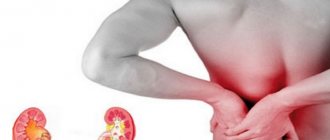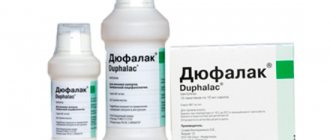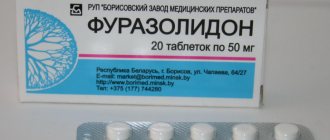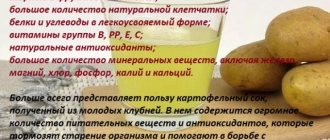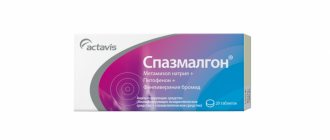Ulcerative diseases of the digestive system are a fairly common problem: from 5 to 15 percent of the world's population suffer from stomach ulcers. There are many drugs that are one way or another aimed at combating this problem, and among them we can highlight the antiulcer drug De-Nol; you need to know how to take the drug correctly.
Pharmacological properties of the drug De-nol
In an acidic environment, De-Nol forms a protective film on the surface of ulcers and erosions, which promotes their scarring and protects them from the effects of gastric juice. De-Nol stimulates the synthesis of prostaglandin E2, which stimulates the formation of mucus and the secretion of bicarbonate ions, leads to the accumulation of epidermal growth factor in the defect area, and reduces the activity of pepsin and pepsinogen. In addition, De-Nol has a bactericidal effect against Helicobacter pylori. Bismuth subcitrate is practically not absorbed into the gastrointestinal tract; only a small amount of bismuth can enter the systemic circulation. Bismuth entering the blood is excreted in the urine, and its concentration in the blood plasma decreases rapidly after treatment. De-Nol is excreted primarily in feces.
Effect of the drug
Since de Nol is the most effective today, it means that it contains the most powerful substances that can fight ulcerative lesions. While taking the drug, a protective film is formed in the abnormal organs, due to which the access of gastric juice to the affected areas is stopped. On the other hand, microbes that cause diseases are destroyed.
The main component of the drug is tripotassium bismuth dicitrate, in other words, just bismuth. The fact is that with any diseases of the stomach and intestines, the protective barrier, which is a mucous layer, is largely lost, so unprotected organs become very sensitive to food, especially spicy, fatty and salty. In order for the treatment to be effective, first of all it is necessary to restore this layer, and this is only possible with the use of bismuth, which creates a protective film.
The gastrointestinal tract is capable of producing pepsin, bile acids and other enzymes that have a negative effect on the affected mucosa. Thanks to the components of the drug, de Nol has multiple effects: protects the mucous membrane, increases local immunity, helps produce natural mucous membrane and suppresses the proliferation of harmful microorganisms.
In addition to its advantages, bismuth also has disadvantages, for example, it is considered a toxic substance. Therefore, using it beyond the specified period is strictly not recommended. It is precisely because of toxicity that de Nol is not compatible with alcoholic and caffeinated drinks. When using the latter, the effectiveness of treatment is significantly reduced. It should also be noted that it is not advisable to consume dairy products.
Indications for use of the drug De-nol
Peptic ulcer of the stomach and duodenum, gastritis, including those associated with Helicobacter pylori (as part of anti-Helicobacter pylori therapy regimens); chronic gastritis and gastroduodenitis in the acute phase, including those associated with Helicobacter pylori ; functional dyspepsia not caused by organic diseases of the digestive tract; erosive and ulcerative lesions of the mucous membrane of the stomach and duodenum caused by taking NSAIDs; irritable bowel syndrome accompanied by diarrhea.
Description of Almagel
Almagel is an antacid in the form of a suspension with an enveloping and adsorbing effect. It has a white color and a sweet lemon taste. It is used to neutralize hydrochloric acid and reduce the activity of gastric juice, which is necessary for some gastrointestinal diseases.
Manufacturer: Balkanpharma-Troyan in Bulgaria.
The medicine is distributed evenly throughout the gastric mucosa, which provides a long-lasting gastroprotective effect. Contains Mg and Al. The drug has a weak laxative and choleretic effect. The effect develops within a few minutes after administration and lasts up to 70 minutes.
Research and effectiveness
The clinical effect of antacids is manifested in the disappearance of dyspeptic symptoms in the form of discomfort and pain. They have a wide range of applications.
Mg and Al containing antacids have antiseptic properties, increase mucus formation, normalize motor function, and increase the resistance of the gastric mucosa to aggressive factors.
The laxative effect of Mg is compensated by the fixing effect of Al, which also applies to the effect on motor skills. The first substance weakens it, and the second stimulates it.
The two-component drug from Balkanfarm meets the requirements for antacids. It begins to act quickly and retains the effect for a long time, does not lead to withdrawal syndrome, and contains an optimal ratio of Mg and Al. Also, its positive and important aspects include release in liquid form, absorption of bile acids and pepsin, stable maintenance of pH between meals at the level of 3.0-3.5.
Sources:
- Algeldrate + magnesium hydroxide. Register of medicines. ReLeS.ru (05/29/2007).
- Almagel Neo: “buffer” for the stomach – “lightning rod” for the intestines. Pharmacy UA. 2012. Based on materials provided by the representative office (Bulgaria).
Contraindications
Almagel should not be used if you are hypersensitive to the composition. The antacid is not prescribed to children under one year of age. It is permissible to take during pregnancy, but with the permission of a doctor and for no more than 3 days. Contraindications will also include severe kidney disease, Alzheimer's disease, and the period of breastfeeding.
Side symptoms
Almagel is well tolerated.
In rare cases, side effects such as:
- change in taste sensations;
- stomach cramps;
- pain in the epigastric region;
- constipation;
- hypophosphatemia;
- hypermagnesemia;
- swelling of the arms and legs;
- drowsiness;
- osteomalacia.
During treatment, it should be taken into account that the antacid drug reduces the effectiveness of glycosides, beta-blockers, H2-antihistamines, indomethacin and other drugs. You need to inform your doctor about the drugs you are using.
Dosage
Almagel is taken half an hour before meals and at night. Adults – 1-3 spoons 3-4 times, maintenance dose – 1 spoon 3-4 times for 8-12 weeks, for prevention – 1-2 spoons. Up to 10 years – 1/3 of the adult dose, up to 15 years – half of the adult dose.
You can take a maximum of 16 dosed spoons per day. With this frequency of use, therapy lasts no longer than 14 days.
Before administration, the suspension is shaken.
Overdose leads to deterioration of intestinal motility. You need to take laxatives.
Long-term treatment may lead to a decrease in phosphate levels. Therefore, it is necessary to ensure their sufficient intake from food.
Who is it suitable for?
Indications for use with Almagel are as follows:
- peptic ulcer;
- gastritis;
- reflux esophagitis;
- hiatal hernia;
- enteritis;
- duodenitis.
The medicine can be used against the background of digestive disorders caused by an unbalanced diet, smoking, alcohol consumption and drugs.
Use of the drug De-nol
adults and children over 14 years of age are prescribed 1 tablet 4 times a day 30 minutes before breakfast, lunch and dinner and 4 times before bedtime or 2 tablets 2 times a day 30 minutes before meals. Take the tablet with a small amount of water (but not milk). The duration of the course of therapy is 4–8 weeks. You should not take medications containing bismuth for the next 8 weeks. If persistent Helicobacter pylori , it is advisable to combine treatment with De-Nol, 1 tablet 2 times a day, with oral clarithromycin 500 mg 2 times a day and the use of amoxicillin (Flemoxin Solutab) 1 g 2 times a day. If necessary, quadruple therapy is prescribed: together with De-Nol 120 mg 2 times a day, it is recommended to prescribe tetracycline at a dose of 500 mg 4 times a day, metronidazole 500 mg 3 times a day in combination with one of the proton pump inhibitors (omeprazole, lansoprazole, rabeprazole or esomeprazole) in a standard therapeutic dosage. The duration of combination therapy is 7–14 days. To improve regeneration in case of ulcerative defect, further treatment with De-Nol is possible: 1 tablet 4 times a day 30 minutes before breakfast, lunch and dinner, and the 4th time before bedtime. The total duration of treatment with De-Nol is up to 6 weeks (no more than 8 weeks).
Necessary recommendations
Bismuth contained in the drug de Nol is a strong substance, the use of which should be strictly limited. Therefore, it is prohibited to take other medications that contain bismuth in parallel. If this instruction is violated, kidney function is impaired, and quite serious. For existing problems of the renal system, the drug is used in smaller doses.
Experienced specialists recommend using medications, along with bismuth, that significantly reduce gastric acidity. De Nol should not be used during pregnancy or breastfeeding. Drinking alcohol is strictly prohibited! Why alcoholic drinks?
The fact is that both this medication and alcohol are subject to breakdown in the human body by the same enzymes, which significantly reduces the effectiveness of treatment and leads to complications. These enzymes are responsible for chemical processes, therefore, the body perceives the effects of alcohol to a greater extent than drugs. Often, the substances contained in the drug become completely inaccessible.
What happens to de nol if it is not accepted by the body? It simply lingers in the organs and waits to be processed. It seems to be no big deal, but in fact, there are certain requirements and standards for removing the medicine from the body. And if they are violated, side effects appear. This can be compared to an overdose.
Alcohol substances, when broken down in the liver, form very harmful toxins, which can only be gotten rid of with the help of medicinal herbs or tablets. This process is long and complex, so it is better to abstain from alcohol once than to undergo treatment for a long time.
Special instructions for the use of the drug De-nol
Bismuth sulfide formed as a result of taking De-Nol may turn stool black, in which case you should consult a doctor. 30 minutes before and after taking the drug, you must refrain from taking milk and antacids, since the presence of gastric juice is necessary for the formation of a protective layer. Long-term use of bismuth compounds is not recommended due to the occurrence of encephalopathy in rare cases. If you follow the recommended regimen of taking the drug, the risk of this side effect is very low. However, while using De-Nol, it is not recommended to take other drugs containing bismuth. During pregnancy and breastfeeding . Not recommended. Children . De-nol is used in children over 14 years of age. data on De-Nol’s ability to influence reaction speed when driving vehicles and working with machinery . However, such an effect of the drug is unlikely.
Contraindications and compatibility with other substances
Using the drug with antibiotics worsens its effect.
The effectiveness of De-nol decreases when interacting with various foods, fruit juices, milk, so it is taken on an empty stomach and washed down only with water. If you combine De-nol with antibiotics, they will be less absorbed. Like other medications, De-nol has a number of contraindications and in these cases its use is strictly prohibited:
- Pregnancy and lactation, at this time the risk of exacerbation of chronic diseases is especially high, but not all medications can be taken. De-nol cannot be used during this period; only a doctor can suggest the necessary analogue.
- Decompensated renal failure. The drug is excreted from the body through the digestive tract and through the kidneys, so disturbances in their functioning are a contraindication for use.
- Childhood. De-nol is not prescribed to children under 4 years of age; in this case, a specialist will prescribe other medications.
When taken, side effects from the digestive system are possible: nausea and vomiting are sometimes observed, and constipation is also possible. Due to the increased bismuth content, the stool becomes dark in color, and the tongue may also darken. De-nol is not recommended for use for longer than 8 weeks; if taken for too long, an increased content of bismuth accumulates in the body. The prescribed dosage must be observed; if it is exceeded, encephalopathy may occur. Also contraindicated are hypersensitivity to components and allergic reactions.
Is it possible to combine De-nol and alcohol? Although there is no data on their negative interaction, if you are diagnosed with gastritis or peptic ulcer, you must immediately stop drinking any strong drinks, as well as smoking. Tobacco smoke and alcohol have an irritating effect on the gastric mucosa, which negates the entire effect of taking the medicine. Constant consumption of alcohol only aggravates the situation and leads to an even more severe course of peptic ulcer disease.
Thus, De-nol and alcohol are categorically incompatible, and for the entire period of treatment and recovery, alcohol must be completely avoided. Only in this case can treatment be successful.
Cost and analogues
| Means | Price | Analogues/substitutes |
| Almagel | 170 ml – from 180 rubles 10 ml No. 10 – from 215 rubles | Stomalox Ajiflux Altacid Alumag |
| De-nol | 120 mg No. 32 – from 311 rubles 120 mg No. 56 – from 475 rubles 120 mg No. 112 – from 880 rubles | Vis-nol Gastro-norm Ulcavis |
